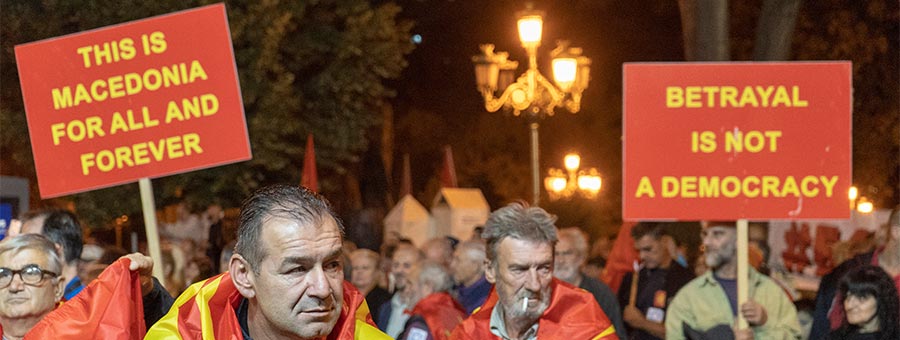EU accession: nationalist opposition ‘sabotages’ Macedonia referendum
Polly Botsford

When Macedonia, the West Balkan state, held its referendum on its new name in September there were several options: ‘New Macedonia’, ‘Upper Macedonia’, even ‘Vardar Macedonia’ after the river that flows through the country. In the end, the proposition was for ‘North Macedonia’.
Macedonia – actually ‘the Former Yugoslav Republic of Macedonia’ (FYROM) – needed a new name because part of Greece is, historically, Macedonian. Greece has gone so far as to block Macedonia’s potential membership of both NATO and the European Union until the name is changed.
The referendum was a gamble. EU membership was at stake, but so too was nationalist pride. If the name change doesn’t go through, it will be a huge blow for those who see the future success of Macedonia, a country of only two million people, as tied with the EU.
When FYROM came into being after the break-up of the former Yugoslavia in 1991, Greece objected to the independent country using the name, arguing that its adoption at the very least demonstrated territorial ambitions to annex Greek Macedonians (who are right next door).
Politicians on both sides are using this opportunity to stoke the fire of populism and gain political benefit from it
Nicolas Rollason
Officer of the IBA Immigration and Nationality Law Committee
Macedonia has contributed to the escalating emotions by, for instance, adopting an ancient Greek symbol for its flag, the Sun of Vergina – which it later modified – and naming its airport ‘Alexander the Great’ (Greeks as well as Macedonians claim him as an ancestor).
The dispute has already pushed Macedonia from the frontrunner position it once had amongst former Yugoslav states for accession to the EU: that place is now jointly held by Montenegro and Serbia.
There may also be wider ramifications for the EU enlargement project in the region, which is back on the agenda in 2018. While EU enlargement is always an ongoing vision, in February 2018, the European Commission published a new strategy for ‘credible enlargement’ and held a summit on EU-Western Balkan relations in Sofia in summer 2018.
The respective governments in Skopje and Athens have recently been prepared to move forward. They’ve been spurred on by the now-former Greek foreign minister, Nikos Kotzias, who was determined to put the lid back on the nationalist box. He told Western press: ‘We have to respect this history and learn from it but not be trapped in it’.
The governments reached an agreement on the new name of ‘North Macedonia’ and even on the official language there, and put this agreement to the people.
But, it looks like the gamble has not paid off. In the final hour, the referendum was boycotted by nationalist opposition in Macedonia in what has been described as an act of ‘sabotage’. Though over 90 per cent of votes supported the new name, only 36.9 per cent of the electorate actually voted, invalidating the result since the referendum needed a 50 per cent turnout.

Members of Bojkotiram (I'm boycotting) celebrating after the referendum
Without the mandate from the referendum, if the proposed name change and the deal between the two countries is to stand a chance, it must go to both the Macedonian and Greek parliament.
On 20 October, the name change cleared the first stage of a constitutional procedure in the Macedonian parliament, but there are still two further stages to go through.
Meanwhile bitter internal political divides in Greece, fuelled by nationalist sentiment, could well scupper the effort there – and potentially bring down the government.
‘Now the proposal has narrowly cleared the initial round in the Macedonian Parliament, there is some hope that all stages of the constitutional process will be completed,’ says Nicolas Rollason an officer of the IBA Immigration and Nationality Law Committee. ‘However, what is clear is that politicians on both sides are using this opportunity to stoke the fire of populism and gain political benefit from it.’
Professor James Ker-Lindsay is visiting professor at the London School of Economics and an expert in south-eastern European politics, says: ‘there is a delusion in Macedonia that somehow the EU will change its mind, that this name-change “rejectionism” is not going to lead to isolation from the EU: the boycott of the referendum was a cowardly abrogation of political responsibility.’
Rollason argues that the migrant crisis of 2015 highlighted the importance of the region, with the EU seeing the Western Balkans as critical in dealing with any such future crisis: ‘these countries were seen as “transit” countries last time, they are relatively under-developed so the danger of trafficking migrants is higher and the countries do not have the same capabilities to deal with huge influxes.’
Part of the willingness to bring West Balkan countries on board the EU mothership is to bolster future migration responses; in 2018 the EU signed an agreement to send EU border guards to the Macedonia border. Rollason points out there is a harsh irony here ‘because it is the same migrant crisis that has contributed to the growing anti-immigrant sentiment which is then blocking the progress of these countries joining the EU: Macedonia says it doesn’t want to be a “holding pen”.’
The potential failure to settle the Macedonia-Greece dispute is a stark example of how intractable the conflicts in the region are. The resolution of other points of tension in the former Yugoslav states, such as the current proposals between Kosovo and Serbia that could involve border changes, is in doubt.
The referendum boycott in Macedonia demonstrated something that’s perhaps more surprising, too: that the prospect of EU accession does not, for now, appear to be the great prize for which conflicting parties may be prepared to work together to win.
Polly Botsford is a freelance journalist and can be contacted at Polly@pollybotsford.com
